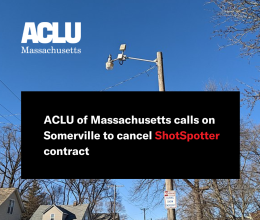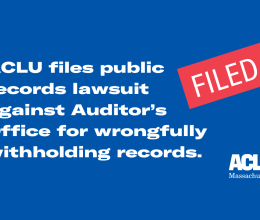
With a public records law that’s at the bottom of the heap nationally (really, we keep getting F grades), Massachusetts lawmakers shouldn’t settle for half-measures and pretend that it’s real reform.
The law’s biggest failure is that there’s no enforcement. Zero. In fact, we don’t even have the primary enforcement mechanism that defines other states’ laws – the ability for judges to award people attorney fees when an agency’s violations force them to go to court. That’s the way it works in 47 states, but not Massachusetts. Here, we have a completely toothless law, which puts a big, gummy grin on the faces of scofflaw officials.
Municipalities and state agencies alike know they can delay, deny, or completely ignore public records requests without facing any consequences. Indeed, a solid majority of cities and towns across the state felt absolutely no qualms about ignoring requests from a group of Northeastern University students who recently sought information about local government payrolls and police use-of-force policies. Transparency be damned.
According to the Boston Globe:
"It was probably the largest test ever conducted of how cities and towns in the state respond to requests for government records from average citizens.
"And Massachusetts failed.
"A solid majority — 58% — of the Commonwealth’s 351 municipalities did not respond within the 10-day limit set by state law when they received a written request for two records that are almost universally considered to be public."
So, what’s to be done?
How about not cutting the scofflaws any more slack? It’s time for the state Senate to step up to the plate and pass legislation that not only enables courts to award fees to people who have been unlawfully denied records, but guarantees such awards.
In November, the House took a step in the right direction by passing a bill that would allow courts to award attorney fees when officials violate the law. Yet challenging denials under the public records law shouldn't be an expensive gamble. To make sure that John Q. Public doesn’t bear the cost of enforcing our public records law, attorney fees should be awarded as a matter of course when a court finds that officials unlawfully denied a person access to public information.Mandatory attorney fees are a win-win reform. They make clear – with a strong incentive – that government agencies actually need to make public information accessible to the public. The law is more than a mere suggestion. And when officials get this message, it shouldn’t cost cities and towns a cent. All they have to do is follow the law.
Most states now require fee awards when officials violate the law, and in recent years many have moved away from fees that are merely discretionary, because they are far less effective. This includes plenty of states we frequently compare ourselves to, such as California, Florida, Illinois, New Hampshire, New Jersey and Rhode Island.
It’s time for Massachusetts to do the same. Enforcement of the law should not be optional.
Gavi Wolfe is legislative counsel at the ACLU of Massachusetts.






